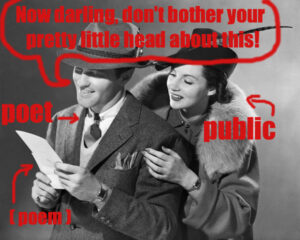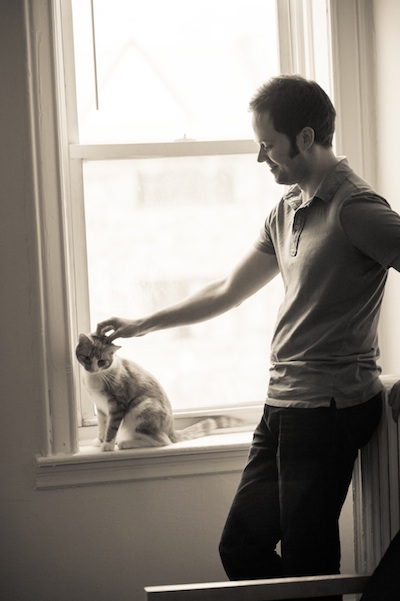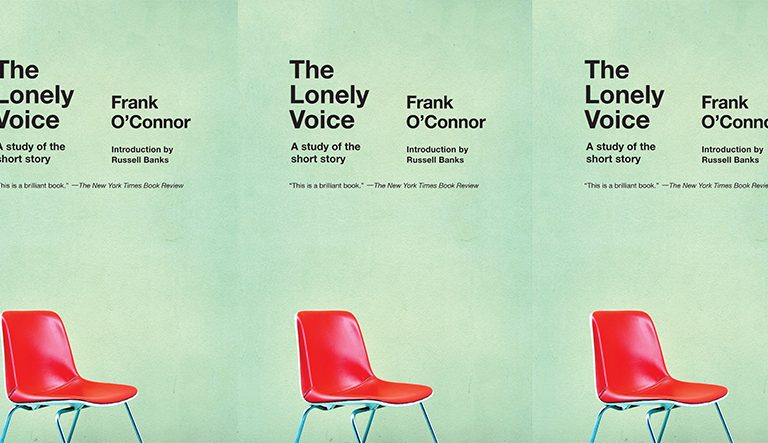Why Poetry Can’t Find Its Public, Part Two
 A couple months ago, my blog, “Why Poetry Can’t Find Its Public” nearly caused a riot. Teeth were bared! F bombs thrown! I wanted readers to learn from pop music’s ability to connect with more people. Readers translated this as a suggestion that poetry be like pop music, sell like pop music, sell out like pop music, and compete with pop music. But actually (gasp!), none of these is necessary for one to learn from pop music. So, dear poets, you can climb out of your bunkers.
A couple months ago, my blog, “Why Poetry Can’t Find Its Public” nearly caused a riot. Teeth were bared! F bombs thrown! I wanted readers to learn from pop music’s ability to connect with more people. Readers translated this as a suggestion that poetry be like pop music, sell like pop music, sell out like pop music, and compete with pop music. But actually (gasp!), none of these is necessary for one to learn from pop music. So, dear poets, you can climb out of your bunkers.
I can’t help but think this ruckus was inspired by the very Myth my post was blasting: that merely discussing “audience”—particularly one as large as pop music’s—will cause all poetry to suddenly and irrevocably mutate into “California Gurls.” 
We’re afraid that if we admit we want (more) readers, we’ll start writing what we think they want… or measuring the validity of poetry by its sales. Dear poets, this doesn’t have to be. Yes, writing-for-sales spells creative death. But once a work is completed? Perhaps the gracious thing then is to put it where it can be found.
Unfortunately, here we often encounter a similar myth: that wanting readers isn’t a noble enough desire for “real” poets—that we should instead write strictly “because we must,” or because “the muse has us.” Nobody wants to actively seek a readership and thus prove herself a disgrace.
But as George Orwell has famously illustrated, there are (valid!) motivations for writing that actually require a readership. And if our work is driven to any degree by its potential human impact, as Orwell’s was, it’s irresponsible to eschew the work of reaching out. This was what I wanted us to translate from pop music: Its gritty determination. Its insistence on being heard. Its put-our-stuff-where-folks-will-find-it creativity. Its refusal of insularity.
It’s time for writers to stop feeling shallow or guilty for wanting what only makes sense: to be read. It’s time we stop policing each other’s motives and frowning on self-promotion, and instead empower each other to explore where our poetry can go. Why? Because if readers are required to want and seek poetry in order to find it, we’ll never get beyond each other. If the wider world’s not reading poetry, it’s at least in part because it rarely encounters it. That’s what we can change.
In Which Poetry Goes Looking for Its Public
 Part One of this blog ended with a list of questions to get us thinking more imaginatively about where our writing can go. Below, I dive into 3 of those Q’s… and I’d love your help! Please continue these brainstorming lists in the comments. Poetry is bigger—and better—than its status as mysterious fringe art. Let’s get it out there.
Part One of this blog ended with a list of questions to get us thinking more imaginatively about where our writing can go. Below, I dive into 3 of those Q’s… and I’d love your help! Please continue these brainstorming lists in the comments. Poetry is bigger—and better—than its status as mysterious fringe art. Let’s get it out there.
I. How and where can my poetry get read, apart from journals only my peers read?
Note that this isn’t about poetry in general. It’s about your poetry. Where can your work go? Don’t be too precious. Think like a musician, a visual artist, a dancer. How would you share your work if you lived in their worlds? (Note to established poets: this isn’t just for poets who can’t get published in traditional venues. Even poet laureates should be asking: how can my work get in front of people who aren’t looking for poetry?) Continue this list in the comments!
- Publish a poem on business cards; ask to place a stack by cash registers at local shops.
- Publish a poem as a mural in a local office or coffee place (or have an artist do this for you).
- Record yourself reading a poem; publish it on Soundcloud. Post links.
- Send a rant (or other) poem as an editorial to the local paper or weekly zine.
- See about starting a local version of Poems On the Underground. Think beyond transit.
 II. How might my poems be inserted into existing public conversations? OR: Given the stories, messages, or truths my poetry communicates, where might it help? be relevant?
II. How might my poems be inserted into existing public conversations? OR: Given the stories, messages, or truths my poetry communicates, where might it help? be relevant?
Brainstorm the topics, characters, issues, questions engaged by your various poems. Don’t get too Poetry-Student about it; think broadly. Then ask: where else are these things being engaged? Continue this list in the comments!
- Send your poem to a website, magazine, or (non-lit) journal that addresses a similar topic. (For example, if a poem’s about domestic violence, see about posting it on the website for a local crisis center, or publishing it in a violence-against-women newsletter, journal, or pamphlet.)
- Approach a (non-poetry) blog that regularly discusses similar issues/concepts, and ask about including your poem as a guest post. (Don’t think too small. Don’t limit yourself to bloggers you know.)
- Read or discuss your poetry with a local class or seminar that addresses the same topic. Not to perform for them, but to come alongside—to participate in their work. Consider community classes, a high school, college, library, church, wherever.
- Create postcards featuring one of your poems, then allow a local nonprofit to use them for their mailings, or for giveaways at events. (Collaborate with a graphic designer!)

- Write a commentary to go with your poem. Explain how the poem works and why you’ve chosen to address its concept/topic via poetry as opposed to other means. Publish the result as a guest blog (as in #2), in a local paper, weekly zine, website, etc.
III. With what artists, studies, organizations, thinktanks, products could my poetry partner?
Many poets are connecting their work with other genres and outlets. How can the rest of us got more intentional about it? Continue brainstorming in the comments!
- Give a reading in a local art gallery, and/or schedule a performance at which you and a musician alternate “sets.”
- Ask musicians and/or videographers to create work for or with your poetry… For example, they might set your poem to music or video, or simply create something inspired by your poem. Publish the results on Soundcloud, Bandcamp, facebook, or YouTube. (For inter-genre ideas, check out what what poet Kevin Barrington’s doing with “albums” of poetry.)
- Send a poem to be illustrated by a local high school or college art class. Help them coordinate a local opening (at which you can also read, if you like), or post their work on your blog/site and send them the link to share.
 Wonder about things like choreography.
Wonder about things like choreography.- Enlist local actors to read your poem(s) at a local reading, and advertise it as such. (Poets suggested this in the comments of my first blog. Great results. Great idea.)
In Closing…
 Because I want to reach beyond Poetry Land, some readers have suggested that I want poetry to become simplistic, transparent, or otherwise easily consume-able. This says a lot about what we think of “the public” and their artistic intelligence! But also, it’s rubbish. We don’t have to write “down” to anyone, or convert poetry to ad copy and greeting cards. By brainstorming connective possibilities, we’re changing how we think about where poetry can go—not about what it is.
Because I want to reach beyond Poetry Land, some readers have suggested that I want poetry to become simplistic, transparent, or otherwise easily consume-able. This says a lot about what we think of “the public” and their artistic intelligence! But also, it’s rubbish. We don’t have to write “down” to anyone, or convert poetry to ad copy and greeting cards. By brainstorming connective possibilities, we’re changing how we think about where poetry can go—not about what it is.
Meanwhile, poets lose little by “showing the trick.” If your readers are subscribers to a nonprofit or political newsletter (and aren’t also tenured poets), they may need extra info to know how to read your work—and that’s ok. Provide some context or commentary. Have fun with it. And finally,
Dear Poets, lend us your brilliance!
Add your ideas in the Comments.
Here’s to your work, and to getting it read.


